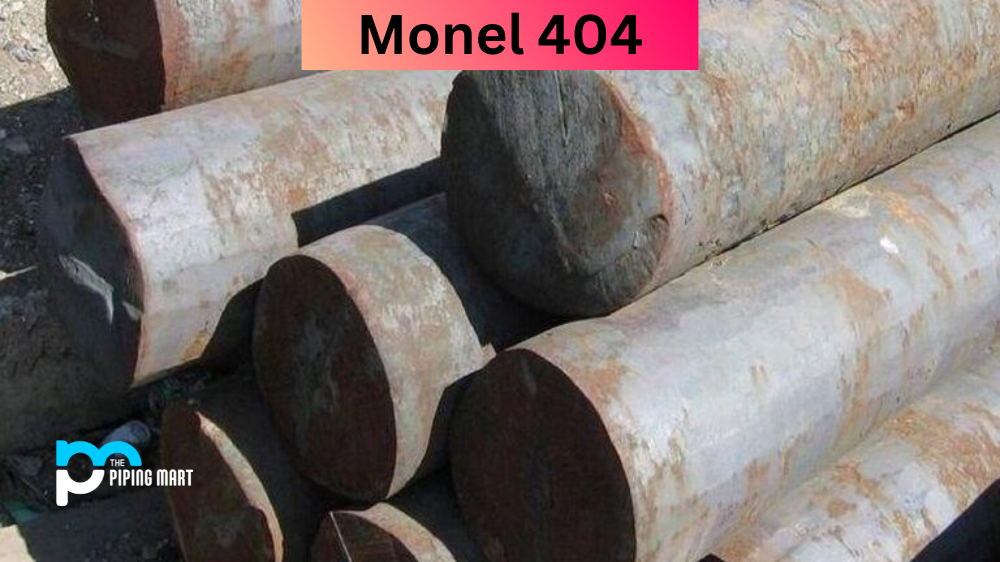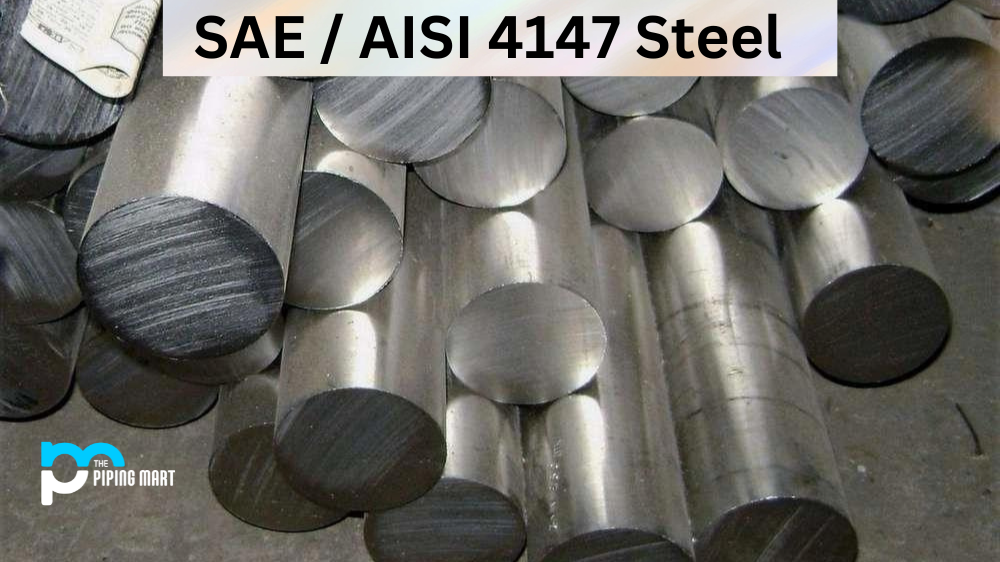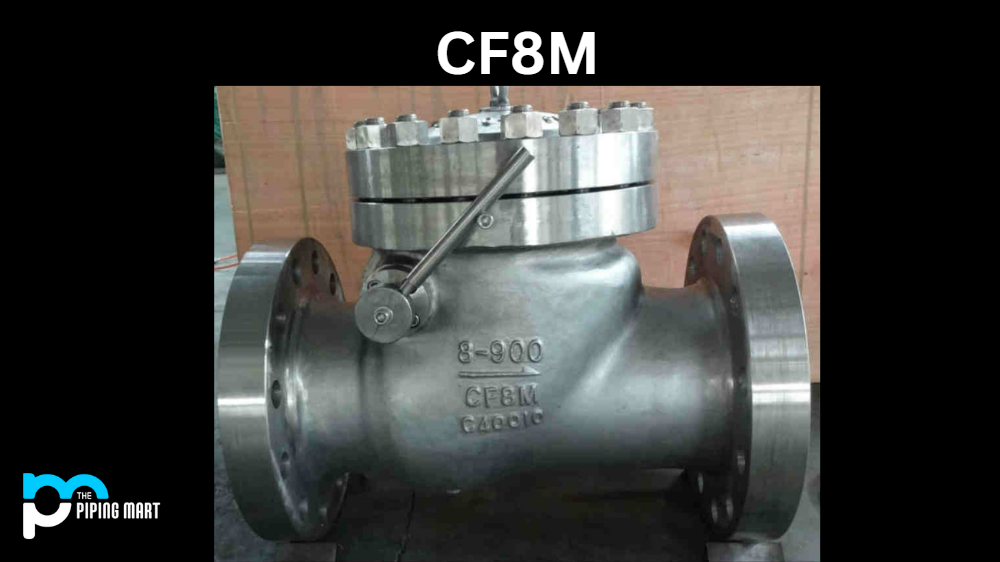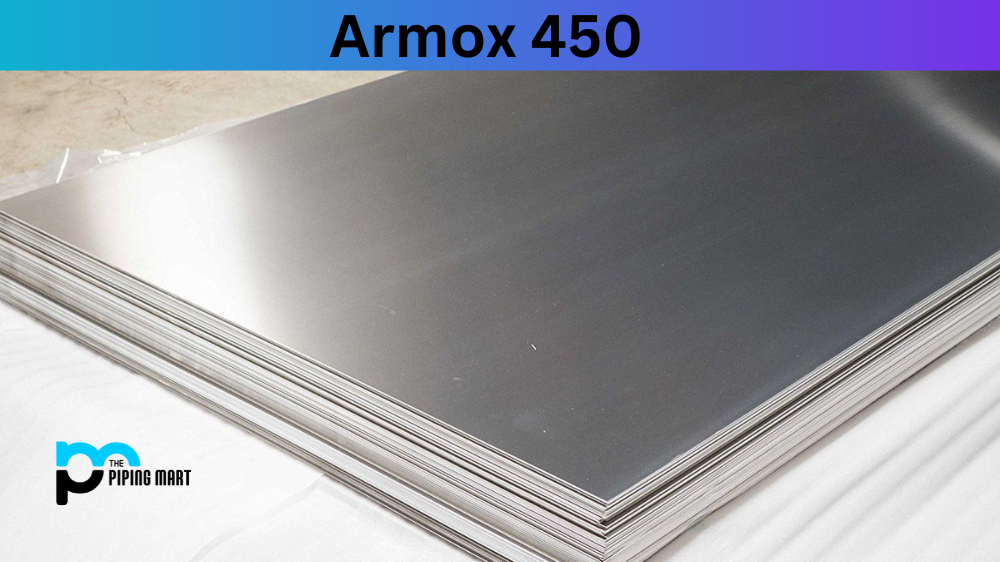UNS N04404 is a nickel-copper alloy with high strength and excellent corrosion resistance. It is used in many industries, including oil and gas production, chemical processing, marine engineering, and power generation. In this blog post, we will look at the composition of Monel 404 and explore its properties, uses, corrosion resistance, heat resistance, heat treatment, machining, and welding capabilities.
Monel 404 Composition
UNS N04404 is a nickel-copper alloy containing 28–34% nickel and additional content of iron of up to 2%. The other elements present in the alloy are manganese (up to 1%), carbon (up to 0.3%), silicon (up to 0.5%), and sulfur (up to 0.024%). The alloy also contains trace amounts of copper (1–2%), titanium (<0.25%) and aluminium (<0.4%).
| Element | Content (%) |
|---|---|
| Nickel, Ni | 50 – 57 max |
| Copper, Cu | ≤ 45.5 |
| Iron, Fe | ≤ 0.50 |
| Carbon, C | ≤ 0.15 |
| Manganese, Mn | ≤ 0.10 |
| Silicon, Si | ≤ 0.10 |
| Aluminum, Al | ≤ 0.050 |
| Sulfur, S | 0.024 |
Monel 404 Chemical Properties
UNS N04404 has excellent corrosion resistance due to its high nickel content as well as chromium additions that improve its pitting corrosion resistance when exposed to chlorides and other halide salts. The alloy also has good oxidation resistance up to 2000°F (1093°C).
Monel 404 Mechanical Properties
The mechanical properties of Monel 404 depend on the tempering temperature – the higher the tempering temperature, the higher the tensile strength and yield strength of the material. At room temperature, Monel 404 has a yield strength of 70 ksi (483 MPa) and a tensile strength of 80 ksi (552 MPa). Its elongation at break is 20%.
| Properties | Metric | Imperial |
|---|---|---|
| Tensile strength(annealed) | 483 MPa | 70 ksi |
| Yield strength(annealed) | 172 MPa | 25 ksi |
| Poissons Ratio | 0.295 | 0.295 |
| Modulus of Elasticity | 169 GPa | 24500 ksi |
Monel 404 Physical Properties
Heat treatments can be used to change the physical properties of Monel 404. After annealing at 1425°F (777°C), the material exhibits excellent ductility with hardness values between Rockwell B 90–95 or Vickers HV50–170, depending on the tempering temperature applied after annealing. Cold working can further increase its strength by up to 25%, but it must be followed by stress relief annealing for maximum ductility recovery.
| Properties | Metric | Imperial |
|---|---|---|
| Density | 8.91 gm/cm3 | 0.322 lb/in3 |
Monel 404 Equivalent
- UNS N04404
- ASTM F96
Monel 404 Uses
Its high corrosion resistance in many aggressive environments such as salt water or acidic solutions combined with good mechanical properties at elevated temperatures make it ideal for use in many industries, including oil&gas production, chemical processing equipment, marine engineering applications such as propeller shafts & hulls as well as nuclear power generation plants where reactor components are exposed to highly corrosive conditions during operation & maintenance operations.
Corrosion Resistance
UNS N04404 provides excellent corrosion resistance in a wide range of environments. Its outstanding environmental durability makes Monel 404 an ideal material for industrial and marine applications where high strength and corrosion resistance are needed. The alloying elements of Monel 404 provide increased levels of protection against general and localized corrosion, pitting, crevice corrosion, stress-corrosion cracking and erosion-corrosion. This material also resists rusting, making it highly resistant to harsh salty sea water even in long periods of immersion. Not only does Monel 404 resist corrosion longer than other materials, but its composition enables it to retain its strength under extreme temperatures as well. For these reasons, it offers a reliable alternative to stainless steel and other alloys in highly corrosive and elevated temperature environments.
Heat Resistance
UNS N04404has long been celebrated for its impressive heat resistance. It can hold up even in a variety of extreme conditions, making it ideal for applications where temperature fluctuation and/or sustained high heat levels are encountered. Monel 404’s heat-resistant properties make it an excellent choice for components that have to operate under conditions like those found in industrial production or generating power. Its strength allows it to withstand forces and temperatures that would normally cause other materials to deteriorate rapidly. As such, Monel 404 is a trusted material used successfully in numerous industries to achieve the best possible results.
Heat Treatment
Heat treatment of Monel 404 is an important part of the alloy manufacturing process as it allows the properties to be tailored to a specific product application. This process involves heat treating the material at a temperature between 815 and 871 degrees Celsius, depending on the desired result. During this process, grain boundaries are developed, which can increase strength and surge resistance in finished products. Special care must be taken during heat treatment as Monel 404 may experience changes in mechanical properties due to distortion or embrittlement. Pressure relief annealing is often utilized to alleviate these issues without transferring stresses from one part of a component to another.
Machining
Machining Monel 404 can be an intimidating task due to its difficult composition and properties, but with the right tools and knowledge, it doesn’t have to be a hassle. Monel 404 is a nickel-copper alloy that contains iron, manganese, and small amounts of silicon and carbon. It is known for its great strength and non-magnetic qualities. When machining Monel 404, it’s important to use high speeds, feed rates, and cutting speeds for better results. Using coolant helps improve chip flow during machining as well. Ultimately, one must have a good understanding of the properties of this nickel-copper alloy before attempting to machine it so that usage of improper tools or techniques can be avoided.
Welding
Welding Monel 404 can be a tricky process because of its high nickel content. To ensure successful welding, a good welder must have a thorough understanding of the material and its behaviour during the welding process. It is important to consider both the pre-weld and post-weld treatments, including the choice of filler material. Properly executed welds will provide a reliable joint that will stand up to the elements and last for an extended period of time. Choosing the right equipment and techniques is vital in achieving quality welds with Monel 404, as it can be difficult to weld without causing distortion or cracking. Although working with this unique alloy can be challenging at times, by following the right precautions, even novice welders can create strong and lasting joints.
Conclusion
Monel 404 is widely used in many industries due to industrial grade components which require enhanced corrosion & wear resistance along with higher temperatures capability than standard stainless steel grades offer while retaining mechanical properties under extreme conditions whether they are subject to continuous load or thermal shock cycles during operation & maintenance operations making it suitable for demanding applications where service life plays a major role in the decision-making process when selecting material grade for specific application requirement best fit for given situation & budget availability limitations if any exist on project timeline & scope considerations. With the ability to weld without risk of cracking or embrittlement through post-weld heat treatment, this nickel-copper-based superalloy offers a good combination of desirable characteristics required from modern materials used today across a broad range of sectors worldwide while keeping cost factors into account, allowing users to take advantage from its superior performance capabilities enjoyed since mid 20th century when it was first introduced into market place replacing older generations materials utilized prior that period time frame.
All these features make it the perfect candidate solution when looking for material grade capable of offering reliable performance applicable given situation while taking cost factor into consideration which makes it one of the most popular alloys around the world nowadays.

Meet Bhavesh, a seasoned blogger with a wealth of knowledge and experience. From metal products manufacturing to retail, Bhavesh has a diverse background in various industries and is dedicated to sharing his insights and expertise with readers.




